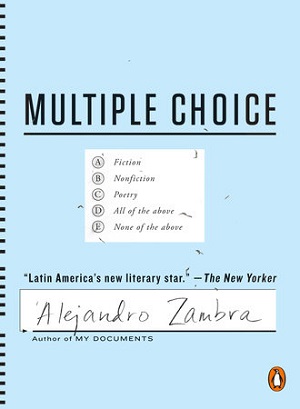 Multiple Choice by Alejandro Zambra
Multiple Choice by Alejandro Zambra
Translated by Megan McDowell
Review by T.m. Lawson
Perhaps it is the cover design’s callback to blue books that provokes a nostalgia that seems to be trendy these days. (Has it ever not been trendy to peddle the past?) Or maybe it is the clever title in conjunction with the design: Is this book A) fiction? B) Nonfiction? C) Poetry? D) All of the above? Or E) None of the above? Alejandro Zambra punctures the distinctive lines between genres in this collection, earning the proud The New Yorker praise that he is indeed “Latin America’s new literary star.”
I’m inclined to agree; it surprises me that the book was not more of a splash in the U.S. considering our literary love affair with Jorge Luis Borges and Gabriel García Márquez, and our recent history with the transformation testing in schools. The No Child Left Behind Bush-era policy has left behind a scar in children’s education and a belief that governments are not concerned with an educated populace but pliable citizens. Zambra hits on these notes very well. In his short story, Text #1, the narrator’s former grade school teacher, now a retired bus driver, serves as an embittered voice as he asserts to his former students, “[School] is rotten, but the world is rotten […] They prepared you for this, for a world where everyone fucks everyone over. You’ll do well on the test, very well, don’t worry—you weren’t educated, you were trained.” The narrator notes immediately that “it sounded aggressive, but there was no contempt in his tone, or, at least, none directed at us.”
The whole of the book plays with form, mirroring a standard testing packet as it transitions from word choice to longer texts. This in itself is novel, however Zambra takes off with the constrictions, effectively blowing my mind with each page. Consider this excerpt from “I. Excluded Term”, in which the reader (or tester) should “mark the answer that corresponds to the word whose meaning has no relation to either the heading or the other words listed.”
1. MULTIPLE 4. FIVE
A) manifold A) six
B) numerous B) seven
C) untold C) eight
D) five D) nine
E) two E) one2. CHOICE 6. BODY
A) voice A) dust
B) one B) ashes
C) decision C) dirt
D) preference D) grit
E) alternative E) smut
One could sooner pick the prettiest star in the heavens than decide on a selection. Zambra boxes the reader in while liberating diction; indeed, how could you pick a word that does not belong when you really think about the direction they take you? It’s clever work, but it goes beyond simple cleverness. Zambra makes this section the most poetic out of all of them because of the compressed nature of exercises and the limited real estate given to the ideas he spreads on the page. It feels holistic how one “exercise” leaps to the next, all of them seeming to complement one another and build on each other like bricks. They are simple selections, not ten dollar words by any stretch of the imagination. Alejandro does magic with simplicity, and it plays to his literary strengths. My favorite pair end off this section appropriately:
23. SILENCE 24. SILENCE
A) fidelity A) silence
B) complicity B) silence
C) loyalty C) silence
D) conspiracy D) silence
E) cowardice E) silence
The other sections include II. Sentence Order, III. Sentence Completion, IV. Sentence Elimination, V. Reading Comprehension (in which he gives three long prose selections called Texts and asks intricate questions analyzing the content). The second section is Zambra’s most enjoyable because of how it twists the brain and requires participation from the reader; it does not request. Instead, Alejandro sets up a “build your own adventure”, sculptural in tone depending on the reader’s placement. It requires brain activity, no passive intake of information.
26. The second 27. A child
1. You try to remember your first Communion. 1. You dream that you lose a child.
2. You try to remember your first masturbation. 2. You wake up.
3. You try to remember the first time you had sex. 3. You cry.
4. You try to remember the first death in your life. 4. You lose a child.
5. And the second. 5. You cry.A) 1-5-2-3-4 A) 1-2-4-3-5
B) 1-2-5-3-4 B) 1-2-3-5-4
C) 1-2-3-5-4 C) 2-3-4-5-1
D) 4-5-1-2-3 D) 3-4-5-1-2
E) 4-3-2-1-5 E) 4-5-3-1-2
This is Zambra waking up the reader and putting some semblance of stress that is akin to … dare I say, a final exam? But there is too much self-awareness, too much good humor as he pokes fun at all sorts of themes and subjects (the writer’s life, soured relationships, family arguments, a woman’s breast cancer) to be weighed down by any overt academic influence this format could take on. Alejandro Zambra is daring the reader to pick up the blue book and take a test, which begs the question: what does it mean to pass?
Multiple Choice is available now through Penguin Random House.
